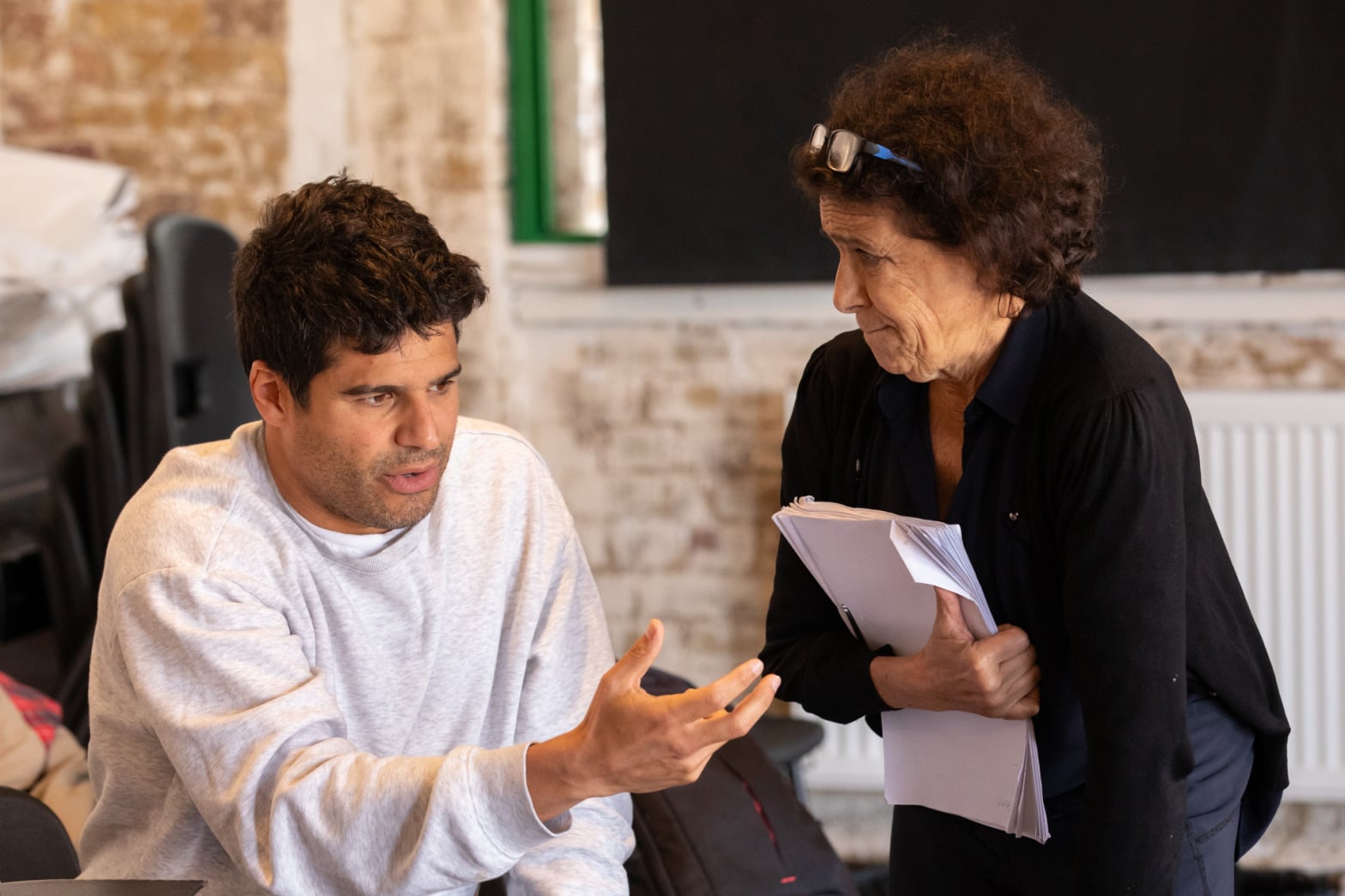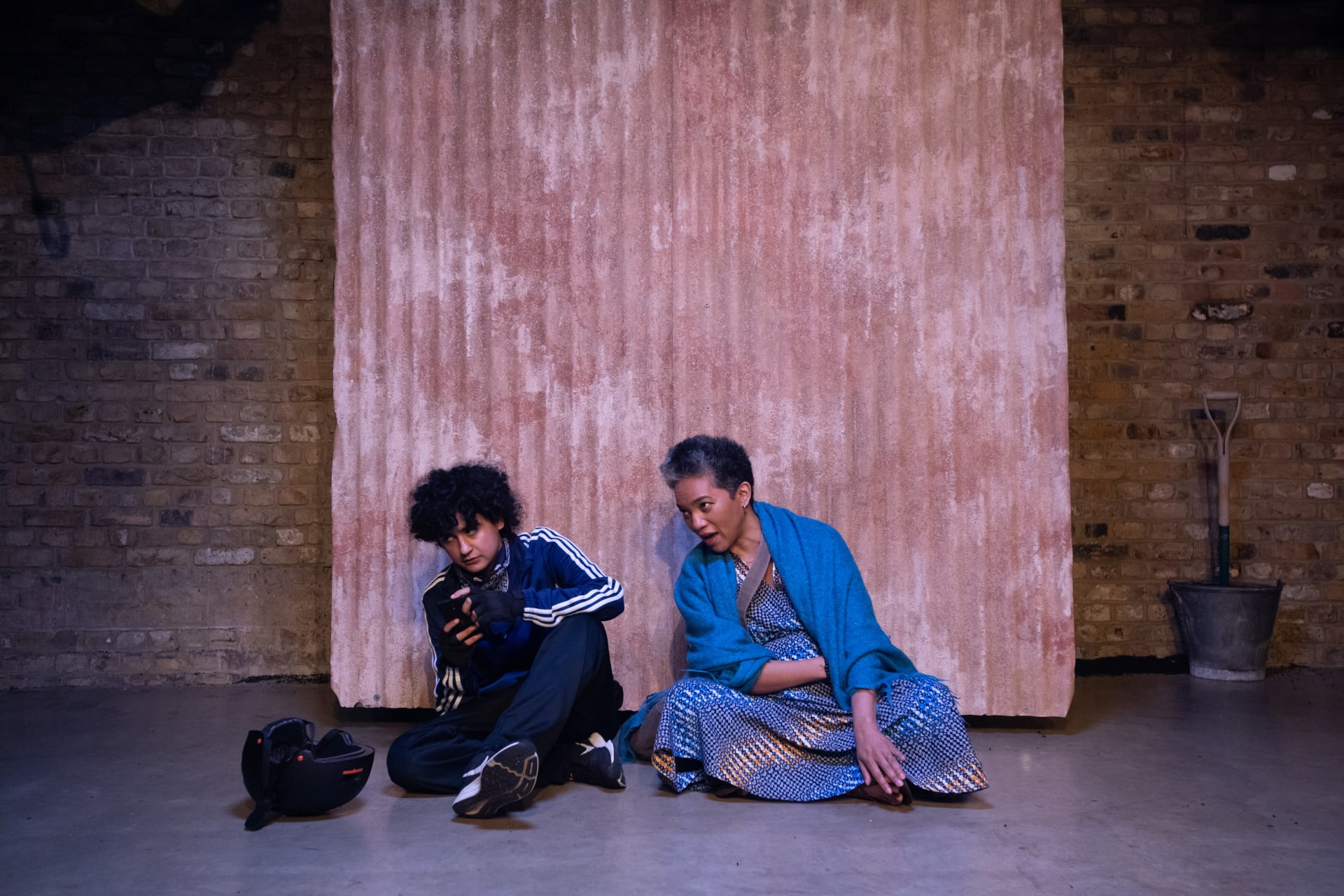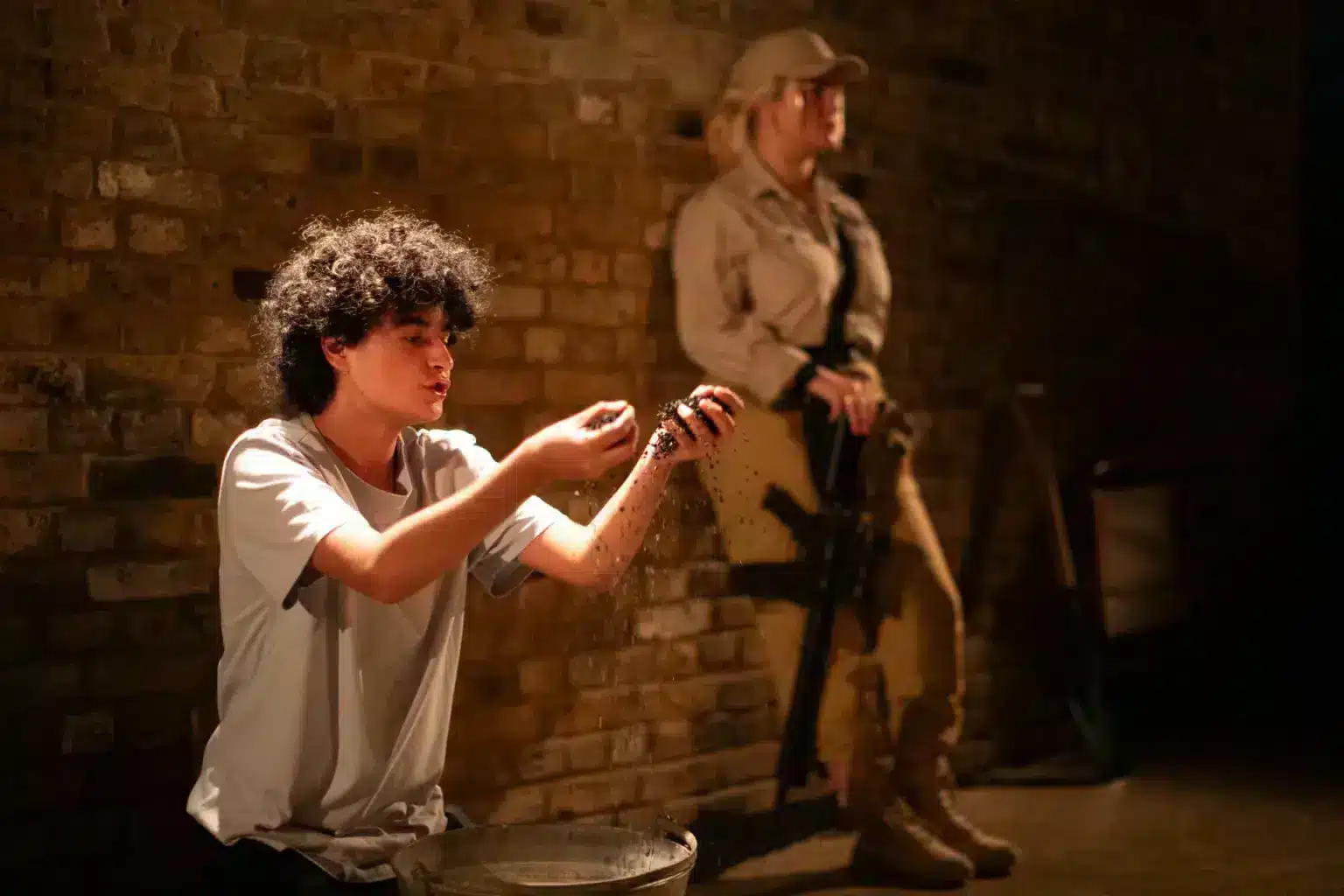
Billed as ‘Beckett meets Mean Girls,’ the play Gigi & Dar—by playwright Josh Azouz and directed by Kathryn Hunter—is a comic tragedy which centres on two 19-year-old eponymous female soldiers of unspecified ethnicity during the occupation of an unspecified land in an unspecified time. Best friends Gigi (Tanvi Virmani) and Dar (Lola Shalam) are hours away from completing their service when they come across a mother (Chipo Chung) and son (Roman Asde). An act of betrayal sets into motion a series of unstoppable events culminating in violence, with the play asking: what would you bury in order to survive?
The creators talk to A Rabbit’s Foot about war, clowning, Hollywood, grief, ghosts, mumblecore and the magic of theatre.
GG: How did this collaboration come into being?
JA: During Covid, we made a short film together on Zoom for BBC Four. I wrote it and Kathryn and her late husband, Marcello [Magni], were in it. I had seen Kathryn’s work as a director in My Perfect Mind (Young Vic, 2014). On a whim, I sent Gigi & Dar to her.
KH: I first read the play in Tanzania, just after my husband’s memorial, I was at a yoga retreat. I read it on my phone in the dark and I thought, oh yes, this is something special.
GG: What caught your eye?
KH: The way the story progresses, the tone, how it subverts your expectations: it takes you deeper into something quite terrifying. I liked the way Josh plays with a sense of time and place. When the actors read the script for the first time, there was a ‘combustion’ and that only happens when the writing is good.
GG: Did you workshop it before rehearsals?
KH: We did. We put it on its feet and began to see the playful possibilities. The Arcola offered us the big space but we went with the studio. Our characters directly address the audience so the intimacy of the smaller space is more powerful. The simplicity worked with the design concept that translated on a poetic level.
GG: The set and the use of props are sparse. Can you set the scene for the reader?
KH: There are just a few elements: a yellow umbrella, a sheet of metal, a bucket of earth, a spade. We did wrestle with the question: what does the audience see and what do they imagine? We had big talks about the guns the soldiers have. Do we use prop guns or imagine them? We went with replica M4s. They are heavy. They look pretty scary.
GG: From script to stage, were there any drastic changes?
JA: I would say maybe 20% changed. The story beats are the same. From a practical perspective, some things read well on the page but didn’t work when we tried to stage them, such as juggling with a grenade. And sometimes you just need to get somewhere quicker. The page is forgiving, the stage is not.

GG: What was the casting process like?
KH: It’s a four-hander. The balance of actors is always hugely important. The first workshop was in The Royal Court. Then for auditions, sometimes we paired them together in chemistry tests.
JA: The play is about soldiers set in an unspecified place: ‘Roadblock 432’. It could be anywhere. So we could cast whichever actors we wanted. No ethnic grouping. I had originally considered setting it in a particular place but I felt like my own politics were getting in the way of these people becoming proper characters. I worried that a character might become a spokesperson for a whole nation. And I thought, that’s not a free way to be an artist. With an abstract setting you can imagine other conflicts and find universal truths and commonalities between conflicts.
KH: Genevieve, did you have references going on in your head when you saw the play?
GG: Yes, Rosencrantz and Guildenstern Are Dead and Waiting for Godot feel like very strong influences. Did the actors influence the script at all?
KH: Yes. The mother, Zoz, played by Chipo Chung, sings a song in the play. The song in the script is unspecified. Chipo is Zimbabwean and she met with elders who taught her songs for the show. They are a ‘rage-lament’ that suited the moment perfectly.
GG: Kathryn, how do you like to work as a director?
KH: Collaboratively. Backstory work.
JA: She went straight in! They were staging stuff on the first afternoon.

GG: How did you approach the play’s physical comedy?
KH: We did bits of clowning. And fortunately, the two girls, Gigi (Tanvi Virmani) and Dar (Lola Shalam) have funny bones. The body is always telling a story; where the body exists in the space. It’s part of my psyche. Josh and I disagree on some physical storytelling.
JA: We do. I did go to Gaulier [the clown school in Paris]. I did four months and got the drum [Gaulier’s drum signals the failure to amuse]every single day.
JA: Kathryn wants the physical comedy to be explicit and I want it to be very subtle.
KH: I am being drawn to ‘the subtlety thing’… Subtlety works in such an intimate space, it’s like TV. I’ve been doing quite a bit of filming recently.
GG: What was it like working on The Tragedy of Macbeth with Joel Coen and Poor Things with Yorgos Lanthimos?
KH: I feel quite new to film. I love the focus, the fine levels, how deep you can go with the lens. It demands real specificity. On The Tragedy of Macbeth—that was filmed on the biggest sound stage at Warner Brothers, there was a river and sand, so it almost felt like a theatre play, staged. (Chuckles) Frances McDormand whispering in my ear, ‘a bit less, Kathryn, a bit less’. When the Witches, that’s me, met with Macbeth, Denzel Washington spoke and I thought ‘errr… did he say something?’ I was expecting theatre sound-levels of dialogue. Later, Joel invited me to watch playback on the monitor. And what seemed like nothing in person, on camera, was everything. Denzel knows how to play with the finest levels. That said, there is a trend on television of just mumbling… I found this on the TV show I was working on, Black Doves. It’s a really well-written text. Fine writing. So, don’t we need to hear it? Am I missing something? Maybe this is the new way of talking.
GG: What was filming in the circus-land of the brothel in Poor Things like?
KH: Quite wild! The focus required is exhausting. But you’re kind of rehearsing every take. I find that when the camera is not on you, you always do the better take, you’re more relaxed. The camera kind of fetches things out of you. But coming back to the rehearsal space is like returning to a country that you really love.
GG: Josh, how did you start your writing career?
JA: I was trying to be a director but I found it very hard to get work. Directing is very personality-led. So, I wrote a play called The Mikvah Project. It went on very quickly at The Orange Tree Theatre in 2020 and it suddenly opened all these doors. And I thought, this is my way of doing theatre. I can’t necessarily direct, but maybe I could work in theatre as a playwright.
GG: What advice can you give to budding writers?
JA: It’s clichéd but true: keep writing and write what you want to write. Theatre is a good place to start, getting in a room with actors will test your dialogue. You will get better that way.
GG: Who are your major influences?
JA: Filmmakers: Paul Thomas Anderson, [Quentin] Tarantino. Playwrights: Suzan-Lori Parks, Sam Shepard, Pinter and Beckett, of course.
KH: My late husband, Marcello. He was a lifeforce.I witnessed how an actor can be a firebrand. Now we use technology. He was all bits of technology. A powerhouse. His skill… that was my school—working with him at Complicité and with Simon McBurney as its luminous centre. I did see an amazing Japanese actor called Mikijiro Hira play Medea in Yukio Ninagawa’s production at Edinburgh in the 1980s. I was playing men before then but I found that performance archetypally maternal and totally extraordinary.
ARF: When did you meet Marcello?
KH: 1984. He died two years ago. We had been together 37 years… In fact, Marcello did a show in the studio space here at the Arcola. I hope his spirit is still in there helping us. I will invite him in tonight.
ARF: Marcello?
KH: Yes, I will invite him in to see the play tonight.
GG: If you weren’t in theatre and storytelling, what would you both be doing?
JA: I would like to say I would be a rapper but I would probably be an English teacher.
KH: A yoga teacher. I am one, already.
GG: What’s good about theatre in this country and what needs to change?
JA: What’s good is that there are a lot of theatres. So you can get a group together and put something on. But the economics are prohibitive. It’s very, very difficult to break in. It’s a closed shop.
KH: What’s good is that there is a huge consensus here that theatre, acting and writing, are incredibly important. There is the recognition that theatre in this country is ‘up there’ – we take pride in the quality of actors and writers. However, there’s a sense in the UK that it’ll just ‘happen by itself’. Whereas in Europe, it’s really recognized that it doesn’t just happen by itself. It needs support.
JA: Yes. Theatre in the UK is both overvalued and undervalued at the same time.
GG: Best theatre productions you have seen of late? Work that has stayed with you?
JA: The Confessions by Alex Zeldin. I remember reading Philip Ridley’s Mercury Fur (2005) and thinking, God, he’s doing something visceral on the page I had not really encountered.
KH: I am seduced by the visual magic of Robert Lepage and then the total simplicity of Peter Brook’s work where he stripped everything away. Brook was saying: this—the human being—this is more than enough.
JA: Yes. Brook’s The Suit really lives with you. And why does it live with you? Because it was just like… three performers and a chair. There’s some magic that’s happened that you can’t put your finger on. The mystery of the human body.
GG: What is next for you both?
KH: Some movie things I’m not allowed to say. I am going to be researching with Simon McBurney a piece called The Apology by Eve Ensler who wrote The Vagina Monologues. And another research project where we’re trying to write a show for Marcello about grief with Paul Hunter [the co-director of their company, Told By An Idiot] and Jos Houben. Two movies I am in are coming out now: Megalopolis directed by Francis Ford Coppola and The Front Room directed by Max and Sam Eggers, which is based on a short story by Susan Hill.
JA: I am writing a version of Hansel and Gretel for a company called The Big House. They are all actors who have been in foster care.
ARF: Why should people come see Gigi & Dar?
JA: It’s a wild ride.
KH: Well, the wildness is in the hearts of the characters…
JA: Fair… It’s a comic tragedy about what we bury in order to survive.
Gigi & Dar is on at the Arcola Theatre until November 2nd
Main image: Kathryn Hunter & Josh Azouz by Ali Wright



